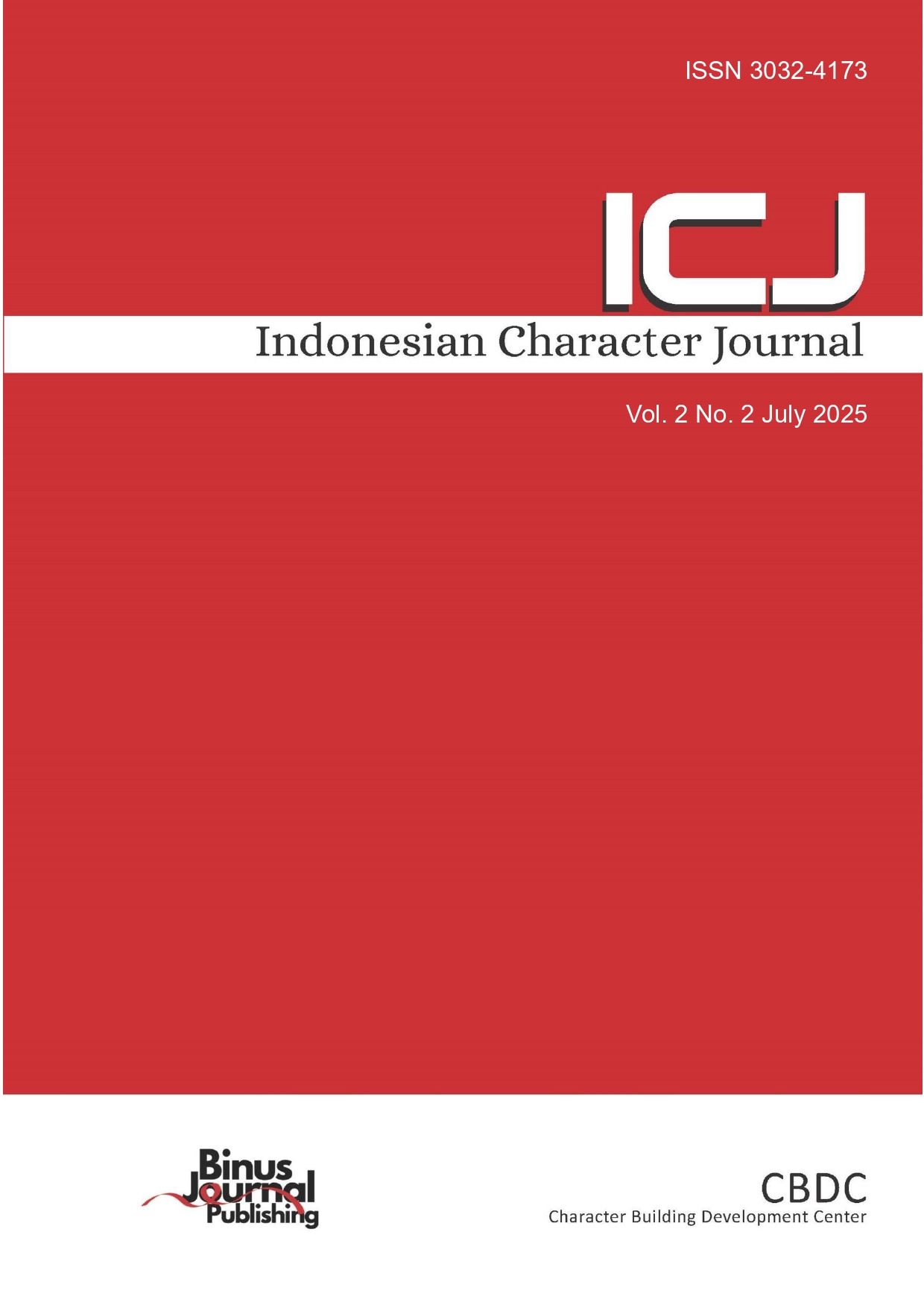Integrasi SDGs dalam Pengembangan Karakter Generasi Muda di Era Digital
DOI:
https://doi.org/10.21512/icj.v2i2.12267Keywords:
Sustainable Development Goals (SDGs), character development, digital era, digital divideAbstract
In the digital age, the main issue in character development is how to empower young people who have the principles of social responsibility, equality, and sustainability amidst the challenging influence of modern technology. The purpose of this research is to explore how the Sustainable Development Goals (SDGs) can serve as a basis for character education and to find challenges and opportunities in its integration in the digital era. The approach used in this research is qualitative descriptive with a literature study method. The results show that through the values of sustainability and equality, the SDGs provide a framework for developing student character supported by digital technology. Some of the challenges that need to be overcome include the digital divide, the negative influence of technology, and cultural constraints. On the other hand, great opportunities are also found in the use of technology to expand access to quality character education. Therefore, the integration of the SDGs in character education requires strategies that involve multi-stakeholder collaboration as well as customization to the local context.
References
Alam, S. (2023, Desember 18). Refleksi Mutu Pendidikan Nasional 2023. Hasil PISA 2022, Refleksi Mutu Pendidikan Nasional 2023. https://mediaindonesia.com/opini/638003/hasil-pisa-2022-refleksi-mutu-pendidikan-nasional-2023
Arifin, S. (2018). Penanaman Karakter Islami Melalui Program Hafalan Takhasus di SD Negeri 3 Gondanglegi Kulon Tahun Ajaran 2017/2018. Rahmatan Lil Alamin Journal of Peace Education and Islamic Studies, 1(1), 47.
Erviana, E. H., & Nugraheni, N. (2024). Peran Pendidikan Karakter untuk Mewujudkan Pendidikan Berkualitas dalam Sustainable Developments Goals (SDGs). 1(3).
Hamzah, A. (2020). Metode Penelitian Kepustakaan: Vol. 23 cm (1 ed.). Literasi Nusantara.
Hendayani, M. (2019). Problematika Pengembangan Karakter Peserta Didik di Era 4.0. Jurnal Penelitian Pendidikan Islam, 7(2), 183. https://doi.org/10.36667/jppi.v7i2.368
Jasmisari, M., & Herdiansah, A. G. (2022). Kenakalan Remaja Di Kalangan Siswa Sekolah Menengah Atas Di Bandung: Studi Pendahuluan. Aliansi : Jurnal Politik, Keamanan dan Hubungan Internasional, 137–145.
Maharani, D., & Kristian, I. (2021). Konservasi Moral dan Pembentukan Karakter Menuju Sumber Daya Manusia yang Berkualitas. Jurnal Dialektika: Jurnal Ilmu Sosial, 19(3), 49–59. https://doi.org/10.54783/dialektika.v19i3.16
Marlinda, S. (2023). Analisis Pengaruh Kemajuan Suistainable Development Goals (SDGs) terhadap Pembangunan Pendidikan Karakter: Suatu Kajian dalam Konteks Perubahan Sosial Global. Jurnal Pendidikan Guru Sekolah Dasar, 1(2), 6. https://doi.org/10.47134/pgsd.v1i2.167
Nurfatimah, S. A., & Hasna, S. (2023). Upaya Membangun Kesadaran Etika Berteknologi Melalui Pendidikan Karakter Bagi Generasi Muda. 2.
Nurkamila, A., Rahmalia, N., & Rachman, I. F. (2024). Tantangan dan Peluang Pendidikan Literasi Digital dalam Konteks SDGs 2030. 2(2).
Nurus, B., & Nugraheni, N. (2024). Penguatan Pendidikan Karakter Sebagai Wujud Pendidikan Berkualitas dalam Upaya Mencapai Tujuan Sustainable Developments Goals (SDGs). Jurnal Citra Pendidikan, 4(2), 1788–1798. https://doi.org/10.38048/jcp.v4i2.3623
Putri, N. S., Saradeba, N., & Rachman, I. F. (2023). Transformasi Melalui Literasi Digital: Peran Generasi Muda dalam Mewujudkan SDGs dan Daya Saing Global.
Rachman, I., Permanasari, A., & Matsumoto, T. (2022). “Environmentally-Friendly Movement” as a Program to Support Sustainable Development Goals Using Text Mining Methods. Journal of Innovation in Educational and Cultural Research, 3(3), 323–332. https://doi.org/10.46843/jiecr.v3i3.97
Rulandari, N. (2021). Study of Sustainable Development Goals (SDGS) Quality Education in Indonesia in the First Three Years. Budapest International Research and Critics Institute (BIRCI-Journal): Humanities and Social Sciences, 4(2), 2702–2708. https://doi.org/10.33258/birci.v4i2.1978
Safitri, A. O., Yunianti, V. D., & Rostika, D. (2022). Upaya Peningkatan Pendidikan Berkualitas di Indonesia: Analisis Pencapaian Sustainable Development Goals (SDGs). Jurnal Basicedu, 6(4), 7096–7106. https://doi.org/10.31004/basicedu.v6i4.3296
Sugiarti, U. (2024, Oktober 3). Pengangguran Lulusan Sarjana Meningkat. Pengangguran Lulusan Sarjana Meningkat, Apa Sebabnya? https://goodstats.id/article/meningkatnya-pengangguran-lulusan-sarjana-apa-sebabnya-q4jYu
Syamsu, N., & Octaviany, M. (2021). SustainableDevelopmentGoals(SDGs) Melalui Pembiayaan Produktif UMKM di Bank Syariah. Islamic Review: Jurnal Riset dan Kajian Keislaman, 10(1).
Triyanto, T. (2020). Peluang dan tantangan pendidikan karakter di era digital. Jurnal Civics: Media Kajian Kewarganegaraan, 17(2), 175–184. https://doi.org/10.21831/jc.v17i2.35476
Wahyudi, L. E., Mulyana, A., Dhiaz, A., Ghandari, D., Putra Dinata, Z., Fitoriq, M., & Hasyim, M. N. (2022). Mengukur kualitas pendidikan di Indonesia. Ma’arif Journal of Education, Madrasah Innovation and Aswaja Studies, 1(1), 18–22. https://doi.org/10.69966/mjemias.v1i1.3
Yulianti, Y. (2021). Pentingnya Pendidikan Karakter untuk Membangun Generasi Emas Indonesia. CERMIN: Jurnal Penelitian, 5(1), 28. https://doi.org/10.36841/cermin_unars.v5i1.969
Zuhri, S., Nazmudin, D., & Asmuni, A. (2022). Konsepsi Pendidikan Karakter Menurut Al-Zarnuji dan Thomas Lickona. Al-Tarbawi Al-Haditsah: Jurnal Pendidikan Islam, 7(2), 56. https://doi.org/10.24235/tarbawi.v7i2.11836
Downloads
Published
Issue
Section
License
Copyright (c) 2025 Preferred Given Name

This work is licensed under a Creative Commons Attribution-ShareAlike 4.0 International License.
Authors who publish with this journal agree to the following terms:
a. Authors retain copyright and grant the journal right of first publication with the work simultaneously licensed under a Creative Commons Attribution License - Share Alike that allows others to share the work with an acknowledgment of the work's authorship and initial publication in this journal.
b. Authors are able to enter into separate, additional contractual arrangements for the non-exclusive distribution of the journal's published version of the work (e.g., post it to an institutional repository or publish it in a book), with an acknowledgment of its initial publication in this journal.
c. Authors are permitted and encouraged to post their work online (e.g., in institutional repositories or on their website) prior to and during the submission process, as it can lead to productive exchanges, as well as earlier and greater citation of published work.
Â
USER RIGHTS
 All articles published Open Access will be immediately and permanently free for everyone to read and download. We are continuously working with our author communities to select the best choice of license options, currently being defined for this journal as follows: Creative Commons Attribution-Share Alike (CC BY-SA)
Â








 This work is licensed under a
This work is licensed under a 